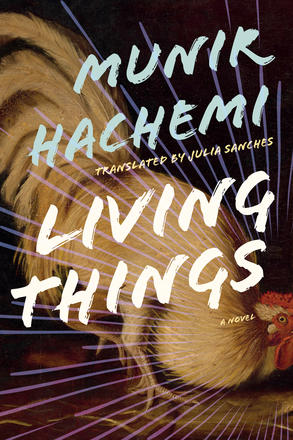
Living Things
WINNER OF A 2023 PEN TRANSLATES AWARD
This punk-like blend of Roberto Bolaño’s The Savage Detectives and Samanta Schweblin’s Fever Dream heralds an exciting new voice in international fiction.
Munir, G, Ernesto, and Álex leave Madrid after graduation for a carefree summer of picking grapes in the south of France. But there's no grape harvest, and they end up in a series of increasingly nightmarish factory-farming gigs, where workers start disappearing. Soon the youngmen find themselves far away from the world of books and ideas, immersed in an existence that is lawless, inhumane and increasingly menacing…
"Gorgeously labyrinthine." – Molly McGhee, author of Jonathan Abernathy You Are Kind
"Startling, compulsive, and vibrant; Living Things reads like an ignition. The most honest thing I’ve read in a long time about being young and alive in a beautiful, horrible world." – Dizz Tate, author of Brutes
"Living Things dips blithely in and out of genres and packs more ideas in its lean frame than seems possible. It’s a novel posing as a journal posing as a meditation on the function of the journal that playfully interrogates form and content in art, what it means to write, and what it means to care or not care about anything, or about everything. Munir Hachemi is a magician, and his marvellous book, deftly translated by Julia Sanches, defies adequate description." – James Greer, author of Bad Eminence
Reviews
"Living Things is by turns cool and frantic, dissociated and visceral, and all the more unsettling for it. Animal cruelty becomes mundane, sandwiched between minutely rendered, lengthy and genuinely funny accounts of negotiations over where to sleep, what to eat, the everyday stuff of life." – Sadie Graham, The Toronto Star
"[U]pstart spirit infuses this short and spunky tale about young, would-be literary men who hit the road in search of adventure but find bleakness and exploitation ... Hachemi’s documentary-style accounts of low-paid factory labor compellingly take us where most fiction writers would rather not go." – Rob Doyle, The New York Times
"Living Things is a socioeconomic critique of industrial agriculture, but can also be read as Cronenberg-style body horror. As a means of necessity, we are living things that eat other living things. It makes for tortured ethical decisions we will forever have to wrestle and understand. But we have to eat, we have to ear a paycheck, despite the bio-ethical implications and consequences. Living Things wrestles with these questions, albeit in a way shot through with humor and personal conviction" – The Driftless Area Review
“Told from journal entries and written almost as a survivor's tale, Living Things is filled to the brim with no fluff commentary on immigration, capitalism, and literature. Four college friends head down to the South of France to work on a grape farm for the summer, an idyllic situation for four men with no real post-grad ambition. But this facade comes crashing down very quickly after they arrive, and realize they will be working in nightmarish factory conditions amongst many other modern horrors. Coach House translations are always such a treat and veer on the absurd and experimental, and this novel takes the cake for them. An absolute feat in translated fiction!” – Grace Sullivan, Fountain Books
"A magnificent debut." – Eugenio Fuentes, La Nueva España
“Hachemi counterbalances the uneasy atmosphere with a constant, subtle underlying humour that feels like a burst of fresh air. Absurdity and latent danger, stirred up in a French heatwave by the naïve insouciance of a group of increasingly tense youths, create an absorbing, somewhat Kafkaesque mood ... [Hachemi] weaves a delicately disturbing tale that contains all the rage and disappointment of facing a reality where only helplessness is possible.” – Gabi Martínez, La Vanguardia
“Living Things is a short novel that changes its skin – and almost its genre – in each of its eight parts ... A work of autofiction that not only defines the self against lived and narrated experience, but also functions as an indictment of social, political, sanitary and economic systems: of the meat industry as it exists today, of racism, of insecure work and financial precarity, and of the voracity at the heart of capitalism itself.... [T]he fact that this all happened to the author affects us not only as readers, but as human beings.” – Carlos Zanón, El País
“An endless array of sounds and ideas reverberate through these pages, at times apocalyptic and at other times deceptively naïve.” – Qué Leer
“Blending together allusions to Hemingway, Borges, Bolaño, Houellebecq and even Lenin, with reflections on Google, the true nature of the livestock industry, the ins and outs of temp work agencies, ecological stability, the free market and the paradoxes of diary-keeping, Munir Hachemi superimposes layers of reality with quasi-apocalyptic detours that reveal the menace underlying seemingly banal situations.” – María Teresa Lezcano, Diario Sur
“From the outset [of Living Things], the first person narration is interwoven with a multitude of meta-literary and philosophical reflections that eventually form a rich second skin, a subterranean engine through which the real story, beyond the descriptions of escapades and setbacks, begins to be understood. A magnificent debut.” – Eugenio Fuentes, La Nueva España